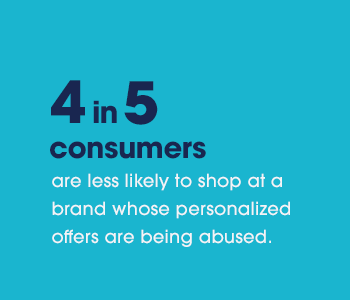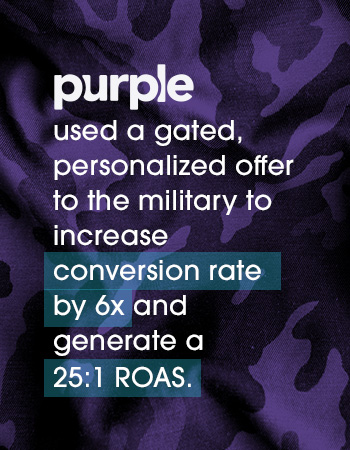Identity marketing is a rapidly emerging form of personalized marketing that many brands are beginning to use. It involves using personalized offers to engage consumer communities like students or teachers, based on their deep-seated identity attributes; however, most marketers don’t understand the importance of customer verification to make this form of personalization succeed.
How Identity Marketing Leverages Personalization
Identity marketing is an approach to customer acquisition in which brands use personalized offers to engage consumer communities. For example, Converse gives a 10% discount to all college students, and T-Mobile gives the military a 50% off its plans.
Identity marketing is a powerful form of personalization because it targets groups that share an important aspect of their identity, such as their life stage or occupation.
When a brand provides members of these groups with a personalized offer, they feel rewarded for who they are, which motivates them to act. More than 4 in 5 consumers say these kinds of offers make them more likely to shop at a brand, and nearly half say the offers make them purchase sooner.
For identity marketing campaigns to be effective, however, brands need to confirm that the customers redeeming the offers are truly eligible for them.
The Importance of Customer Verification
Customer verification is a critical step in an identity marketing campaign because it protects the integrity of the offer. Members of the consumer community need to know the offer is truly just for them, or it loses its appeal.
Customer verification also protects a brand’s reputation. When consumers know ineligible customers can take advantage of a personalized offer, it hurts a brand. Four in five consumers would shop with a brand less often, and half would lose trust in the brand.
Finally, customer verification prevents discount abuse. Brands run identity marketing programs to specifically engage members of a consumer community. When fraudsters can redeem an offer, it cuts into a brand’s margins and weakens its strategy.


How Digital Verification Supports Customer Verification
In the past, brands have tried a number of ways to confirm consumer eligibility for a personalized offer, most notably having customers show their military or student ID in the store. But now that the world has gone digital, the easiest and most effective solution is digital verification.
With digital verification, customers redeem the offer by entering basic information into a short form on the brand’s website and their status as a member of a consumer community is instantly confirmed. It’s an in-brand experience that occurs as part of the purchase process.
How Digital Verification Benefits Brands
Digitally verifying personalized offers saves a brand money and makes the offers more appealing to consumers by:
01 Preventing Fraud
Digital verification increases the ROI of personalized offers by preventing discount abuse, which can be costly. Companies running identity marketing programs see discount fraud at rates as high as 35%.
Many companies offering personalized offers to students verify eligibility with an .edu email address, but that approach is severely flawed. More than half of graduates with .edu email addresses still have them after five years. Using .edu verification also limits your reach: more than 40% of college students were never issued an .edu email address.
It’s also easy to create a fake .edu email address, and many companies lose money to fraudsters who do just that. But digital verification works. When CompTIA replaced .edu verification with digital verification, it reduced discount abuse by 20% and saw an ROI of 20:1.
02 Saving Time and Resources
Many brands try verifying customers through a manual process, such as requiring students to show an ID, or military veterans to provide their DD 214 discharge papers. But manual verification is:
- Inconvenient. Consumers don’t always have the required documents on hand.
- Invasive. Documentation may include personal information a customer might not want to reveal, such as the “character of service” listed on the DD 214.
- A burden on brands. Employees have to spend valuable time reviewing documentation, and may not be properly trained to do it.
Digital verification streamlines the process. When American Giant used it to verify their personalized offer for the military, it saved an estimated 5-10 hours/week. And when Globus used it for their military offer, the program required 75% less effort to implement.


03 Respecting Consumer Privacy
Consumers are worried about their personal data, and they’ll punish brands they don’t trust with it. More than 4 in 5 US consumers won’t do business with a company if they have concerns about its privacy practices.
Digital verification respects their privacy by requiring only basic personal data. More than two-thirds of consumers are willing to provide their name, date of birth, and email and physical addresses to receive a personalized offer.
Respecting privacy is critical when running identity marketing program that target college students. Eighty-seven percent of Gen Zers said keeping their information private was more important than popularity measures such as getting “likes” on posts.
04 Multiplying Marketing Performance
Friction slows down any conversion process. Digital verification streamlines the process of verifying customers. This enables marketers to build organic and paid demand generation campaigns that more effectively drive traffic and increase revenue.
Digital verification also provides marketers with opt-in data they can use to develop re-engagement campaigns with consumers that are well-aligned with their brand.
The Importance of Customer Verification—a Success Story
Purple is one of many brands that has seen tremendous results when digitally verifying customers for personalized offers.
The company wanted to differentiate itself from more than 200 competitors in the crowded mattress space, so it launched a personalized offer giving a 10% discount to active and reservist military, veterans, retirees, military spouses, and registered dependents.
The military community responded well, but Purple was manually verifying customers, which slowed down the process and consumed valuable customer service resources.
When the company relaunched the program with digital verification, it was wildly successful. Alisa Gammon, Purple’s performance marketing director, said it “reduced our support calls to zero and saved our customer service team 49 hours per month. It also increased our conversion rate by 6x and generated a 25:1 ROAS.”
Brands that use customer verification to deliver personalized offers can see the same kinds of gains while encouraging great loyalty.








